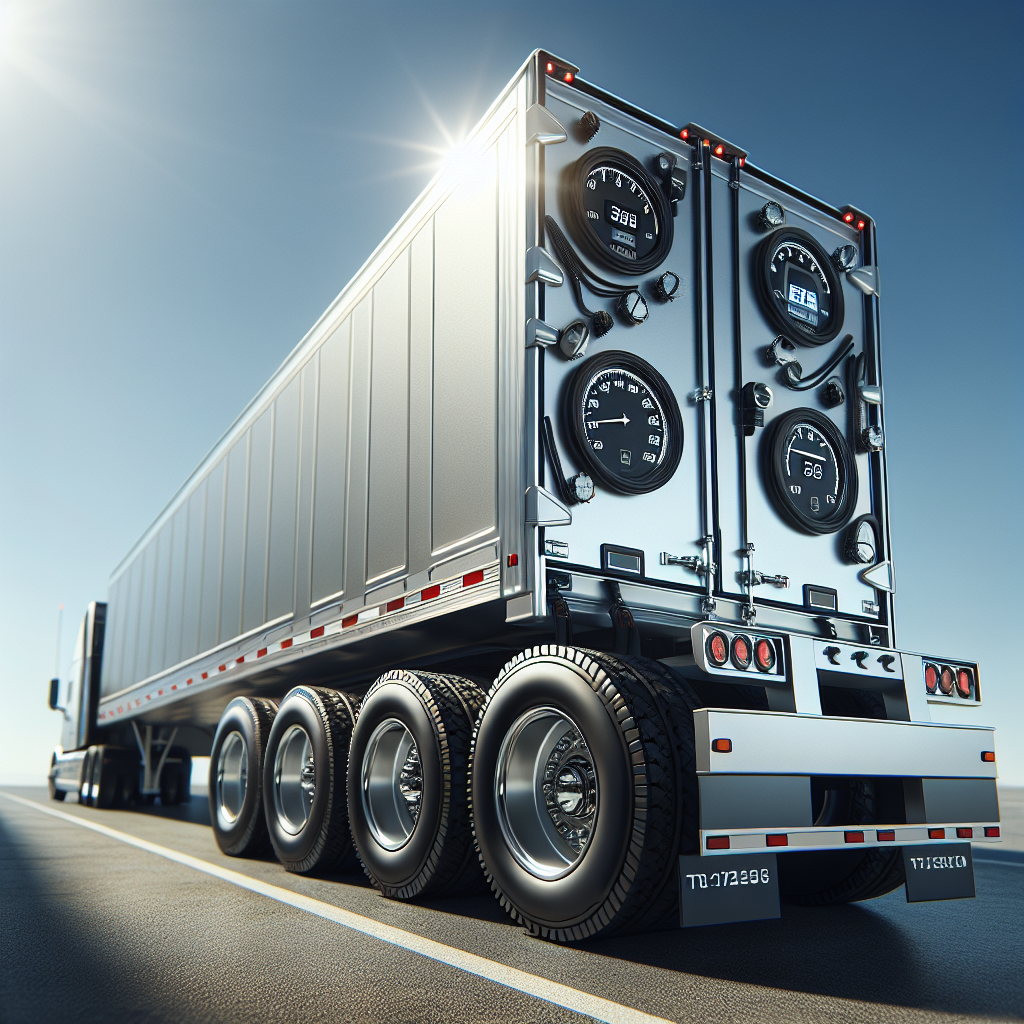In the world of commercial transportation, ensuring the safety of your assets is paramount. This is where a commercial trailer TPMS (Tire Pressure Monitoring System) comes into play. This innovative technology is designed to monitor tire pressure and temperature in real-time, providing crucial data that can prevent catastrophic failures.
Understanding the importance of a TPMS for trailers involves recognizing the risks associated with tire malfunctions. Tires are often the most vulnerable parts of any trailer, and a failure can lead to dangerous situations on the road. Not only can it cause accidents, but it can also result in costly downtime and repairs. With a TPMS, you gain the ability to:
- Monitor Real-Time Data: Receive instant alerts about tire pressure changes, ensuring you can take corrective action before issues escalate.
- Prevent Blowouts: By keeping track of tire temperatures, you can prevent dangerous blowouts that often occur due to overheating.
- Enhance Fuel Efficiency: Properly inflated tires improve fuel economy, contributing to lower operational costs.
When equipped with a TPMS, trailers become smarter and safer, allowing operators to focus on their journey without the constant worry of tire-related failures. Tow with peace of mind, knowing that trailerwatchdog is standing guard. For more information, visit trailerwatchdog.com.
Key Features of a Commercial Trailer TPMS

A commercial trailer TPMS offers a wealth of features designed to enhance safety and efficiency on the road. Understanding these key features is essential for any fleet operator looking to make informed decisions about their trailer monitoring systems. Here are some of the standout capabilities of a modern TPMS:
- Real-Time Monitoring: Continuous tracking of tire pressure and temperature allows for immediate detection of anomalies, ensuring quick intervention when needed.
- Wireless Connectivity: Many TPMS solutions utilize wireless technology, enabling easy installation and integration with existing trailer systems without the need for cumbersome wiring.
- Alerts and Notifications: Users receive instant alerts via mobile apps or dashboard displays for any tire pressure or temperature irregularities, enhancing response times and reducing potential risks.
- Historical Data Tracking: The ability to review historical tire data helps fleet managers understand trends over time and make better decisions regarding maintenance and tire replacements.
- Battery Life Management: Advanced TPMS units are designed with energy efficiency in mind, featuring long-lasting batteries that minimize maintenance efforts.
By leveraging these features, fleet operators can significantly reduce the risk of tire-related incidents and enhance overall operational efficiency. A commercial trailer TPMS is not just a tool; it is an essential component for modern fleet management.
How TPMS Enhances Safety and Efficiency
The integration of a commercial trailer TPMS plays a pivotal role in bolstering both safety and operational efficiency for trailer fleets. By actively monitoring tire conditions, TPMS significantly mitigates risks associated with tire failures, which are a leading cause of road accidents and breakdowns. Here’s how TPMS enhances safety and efficiency:
- Prevention of Tire Blowouts: By providing real-time data on tire pressure and temperature, TPMS can alert drivers to potential issues before they lead to catastrophic failures. This proactive approach not only prevents accidents but also reduces costs associated with emergency repairs and downtime.
- Improved Fuel Efficiency: Properly inflated tires contribute to better fuel economy. TPMS ensures that tires maintain optimal pressure, which can lead to significant savings on fuel costs over time. Fleet operators can enjoy reduced operational expenses while also minimizing their carbon footprint.
- Enhanced Driver Awareness: With instant notifications about tire conditions, drivers can stay informed and make quick decisions on the road. This awareness fosters a culture of safety and accountability within the fleet.
- Streamlined Maintenance: By analyzing tire data trends, fleet managers can better schedule maintenance and tire replacements. This anticipatory approach ensures that trailers are always operating under optimal conditions, further reducing the risk of incidents.
Ultimately, the deployment of a TPMS is a strategic investment in safety and operational efficiency, fostering a safer driving environment while optimizing the performance of commercial trailers.
Preventing Catastrophic Failures with TPMS

Implementing a commercial trailer TPMS is crucial for preventing catastrophic failures that can lead to serious accidents and costly repairs. By continuously monitoring critical tire metrics, TPMS empowers fleet operators to address issues before they escalate. Here are several ways TPMS contributes to failure prevention:
- Real-Time Monitoring: TPMS provides continuous surveillance of tire pressure and temperature, offering immediate alerts if conditions deviate from optimal levels. This allows drivers to take corrective action before a small issue leads to a major failure.
- Data-Driven Insights: With the collection of historical data on tire performance, fleet managers can identify patterns and trends that indicate potential problems. By analyzing this data, they can make informed decisions regarding maintenance and replacements.
- Alerts for Overheating: Overheating tires can quickly lead to blowouts. TPMS systems monitor tire temperatures and send alerts when they reach critical thresholds, allowing operators to address the situation before it becomes dangerous.
- Improved Decision-Making: Access to real-time tire health information enables drivers and fleet managers to make informed decisions during routes. They can plan for stops to check tires or even reroute to avoid potential issues, enhancing overall safety.
Incorporating a TPMS not only helps in avoiding unexpected breakdowns but also enhances the overall safety of the fleet, ensuring that trailers are roadworthy and reliable.
Choosing the Right TPMS for Your Trailer

Selecting the right commercial trailer TPMS is essential for maximizing safety and efficiency. With various systems available in the market, understanding your specific requirements is key to making an informed decision. Here are some important factors to consider:
- Compatibility: Ensure the TPMS is compatible with your trailer type and axle configuration. Systems that can seamlessly integrate with your existing setup will yield the best results.
- Sensor Technology: Look for TPMS that utilizes advanced sensor technology, such as direct or indirect monitoring. Direct systems provide real-time pressure readings from each tire, while indirect systems use existing data from the vehicle’s ABS.
- Alerts and Notifications: Choose a system that offers customizable alerts for various tire conditions including pressure drops, temperature spikes, and more. The ability to receive notifications via mobile apps or onboard displays can enhance your responsiveness.
- Data Management: A robust TPMS should come with data management capabilities, allowing you to track tire health over time. Look for systems that provide historical data and trend analysis to inform your maintenance strategies.
- Ease of Installation: Consider the installation requirements of the TPMS. Systems that are easy to install and require minimal maintenance will save you time and effort.
By carefully evaluating these factors, you can choose a TPMS that best suits your trailer's needs, ensuring optimal performance and safety on the road.
Conclusion: Safety First with Commercial Trailer TPMS

In today's fast-paced world, prioritizing safety is crucial, especially when it comes to transporting goods via commercial trailers. Implementing a commercial trailer TPMS not only enhances safety but also contributes to overall efficiency and peace of mind. By continuously monitoring tire pressure and temperature, a quality TPMS helps prevent catastrophic tire failures that can lead to accidents and costly downtime.
Furthermore, the insights gained from a TPMS can guide maintenance schedules, ensuring that your trailers remain in peak condition. This proactive approach not only protects your investment but also enhances the reliability of your operations.
As you consider the best options for your trailer, remember that investing in a commercial trailer TPMS is a step towards a safer and more efficient future on the road. Tow with peace of mind, knowing that trailerwatchdog is standing guard. Visit trailerwatchdog.com to learn more about how our innovative monitoring systems can make your trailer smarter and safer.








